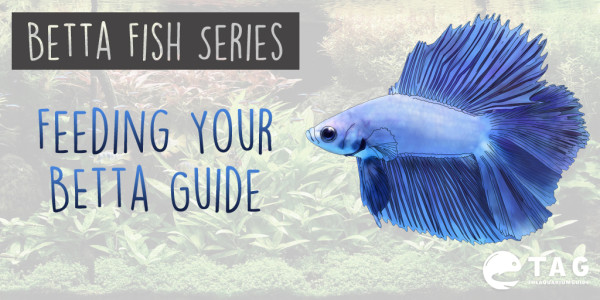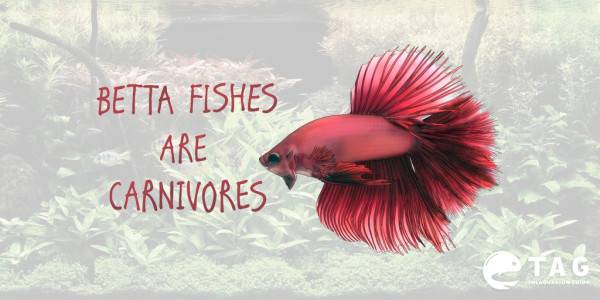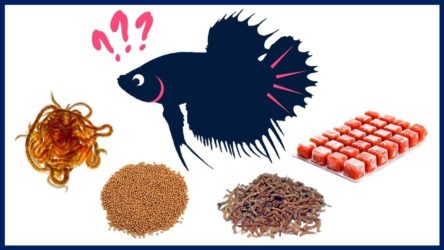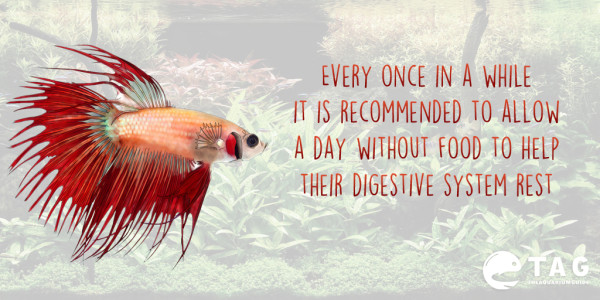In my last post, I shared the various types of betta fish and the post was well received by most of you.
Thank you so much to those of you who took the time to leave me some feedback on the post.
Your encouragement matters a lot to me.
So for the next part of this betta series, I’m going to share a little about the type of food that you can give to your lovely bettas and just how much to feed them.

Table of Contents
Betta Fish Food
As a beginning aquarist, you may have been impressed when you first saw a Betta fish – I know I did; they prove to be some of the most beautiful fish you can have.
As you bring home your new Betta to acquaint to your tank, you will notice they are not high-maintenance.
Betta fish are one of the most low maintenance fish but you still have to pay attention to the small details such as the kind of betta fish food you give them.
In this way, your fish will keep its amazing patterns and colors and can breed and create other great fish. (I’ll share on breeding betta in my next post)
What Type of Food Do They Eat?

Betta Fish are carnivores meaning they will avoid algae, yet will not hesitate to eat small fish in the tank if hungry but that’s only in rare cases.
They are known for being aggressive and attacking their companions, so keep them in a separate tank than small or aggressive species.
Some consider the Betta fish to be a picky eater, but the reality is the quantity of the food is what matters.
The best types of food for Bettas are live brine shrimp or worms, mosquito larvae, frozen or freeze-dried live food, and/or Betta pellets.
Food such as flakes and cubes will not provide a quality meal for them.
Better to feed live food

Live food is preferable, but it is not always easy to purchase.
It can be exhausting to buy bloodworms from the store and growing them in your home can be tricky.
Most of the time, it will not be worth your time if you only have one or two Betta Fish like me.
On the other hand, remember that live food is necessary if you intend to breed these wonderful fish.
1. Live/Frozen Mosquito Larvae
Mosquito larvae are another major addition to betta’s diet in their natural habitat. Surprisingly, betta fish happily chow down on mosquito larvae. Its nutritional value is astounding; it surpasses frozen-dried foods. But, of course, the best thing is to produce Mosquito larvae by yourself through starter culture.
2. Live/Frozen Brine Shrimp
Brine shrimp contains all of the vitamins, protein, and amino acids. It nutritionally surpasses most of the other frozen-dried foods. You can serve brine shrimp once every week with proper scheduling. Before being fed to the betta fish, you should prepare brine shrimp by removing salts by washing them in freshwater.
3. Live/Frozen Bloodworms
Bloodworms have a brilliant red color. Betta enjoys eating blood worms because of their vibrant color and their nutritional value. Also, the blood worms constitute wild diets but lack iron and amino acids.
4. Live/Frozen Wingless Fruit Flies
There is a vast variety of fruit flies. But, it’s highly recommended to avoid feeding fruit flies directly to your betta fish. This is because fruit flies carry diseases sometimes which can cause harm to your betta fish.
5. Live/Frozen Mysis Shrimp
Mysis shrimp are commonly known as opossum shrimp and are another excellent food source for your betta. The rigid exoskeleton of these prawns is loaded with fiber.
Frozen food for an alternative
Frozen food is a great alternative to live food and will give you more time to take care of your tank.
You can feed frozen worms or brine shrimp in small pieces.
If you only find live food every once in a while, divide it into portions and keep it in the freezer for the next few weeks.
Freeze-dried food
Freeze-dried food is one of the bettas’ favorite foods and one of the easiest options for feeding.
Pet stores carry dried bloodworms and such, which only need to be dispersed in small amounts each day.
Although your fish can live perfectly on this food alone, it is recommended to change the menu every once in a while, just to be sure that your betta fish is completely healthy and full of energy.
Pellets for your Betta
Betta fish pellets are specially made for Betta fish; feed one pellet to your betta fish, twice per day.
The pellets have the exact amount of protein and vitamins to maintain the brilliant color of your fish.
On the other hand, ensure the pellets do not accumulate on the bottom of the tank as this can seriously affect the chemistry of the water.
Fish flakes should be the last option
Fish flakes are common and most fish will eat them; however, your betta should not have this type of food unless it is dire.
The disadvantage of fish flakes is the lack of appropriate protein your Betta needs and if your fish is not satisfied with the food you provide, they may attack smaller fish from the tank and even other Betta fish.
How Much Food Does a Betta Eat?
If you do not know how much food you should give to your Betta fish, there is a simple way to find out: give them as much food as they eat in two minutes.
After this short time, your fish will be done eating and the leftovers will create an unhealthy environment of pollutants.
Another interesting thing about the Betta Fish is that they can gain weight; some of them will continue to eat after two minutes and after some time its stomach will grow, in which case your fish will have to go on a diet.
How often should you feed your betta?

Feeding frequency depends on the size of your fish and the type of food you feed it.
In general, adults should never be fed more than twice per day, and once is enough; younger fish will need two meals per day for growth.
Every once in a while it is recommended to allow a day without food to help their digestive system rest.
Make sure, however, not to extend this fast more than you have to, otherwise, your fish will not stay healthy.
How Often Do You Feed A Baby Betta Fish?
Baby betta requires crucial care. They need a good amount of protein as well as fats. If your baby betta is around 4-6 months old, you need to feed 3-5 times a day.
When To Feed A Betta Fish?
Feeding requires a schedule. Unscheduled feeding can be harmful and unhealthy for your betta fish. Therefore, they should be given at least two meals per day, and these meals should have a time difference of about 10-12 hours. For example, feed your betta fish once in the morning and in the evening.
What Nutrients Should Your Betta’s Food Contain?
Here the some of the major nutrients you must have in your betta’s diet:-
- Protein
- Fiber
- Carbohydrate
- Calcium
- Fat
- Phosphorus
- All the Vitamins
Betta meal must be meat-based and rich in protein, as listed at the top of the list.
Cost Of Feeding A Betta Fish
The cost of feeding depends on the brand which you choose. Most brands charge 4-8 dollars for a betta fish pellets container between 4-8 dollars.
Suggested Betta Fish Feeding Schedule
If you talk of a weekly schedule, you can feed three to four fish pellets to your Betta twice every day, for straight four days of the week. And for the remaining two days, you can feed one to two pieces of freeze-dried food or pieces less than 2 times. You need to leave Sunday so your betta can digest completely and revive the whole week’s nutrition properly.
Common Concerns Feeding Betta Fish
What To Do If Your Betta Fish Will Not Eat?
There are several reasons for this behavior of your betta. Suppose it skipped 2-3 meals no need to worry. If it continues for a longer time, change your brand of pellets, or there could be a change in temperature or the environment, so you need to maintain a temperature between 71-86°.
How To Prevent Your Betta Fish From Overeating?
Only feed your betta fish with the appropriate amount to keep them away from overeating. Using a net or a turkey baster, remove any surplus food regularly.
Share your experience
Hope my little sharing here is useful and I would love to hear your thoughts on this. Feel free to leave a comment here or you could also share your experience on the various social media platforms:
Conclusion
Feed them only listed food and according to a weekly schedule discussed. Be careful of overeating and do regular checking of the tank.

10 thoughts on “Betta Fish Series – Feeding Your Betta”
Thank you for your info on feeding Bettas. I seem to be doing most of the things you recommend. I do find, however, that these fish are individuals. Some are constantly waiting for food every day and some every couple of days. I have never found fresh food to buy.
Hi Val,
Yup that’s true. Bettas have their own unique individual personality. (That’s another reason why they are so loved by hobbyist) The guide above is just that – a guide. Ultimately, you need to discover the best method for your own betta. =)
Very informative and i believe it’s all that i need to know about bettas. Would be really helpful if you can do a post about water conditions, ideal ph levels etc. for bettas. Thank you!
Hi Ken,
The pH level for Bettas should be between 6.5 and 7.5 pH, preferably 7. Make sure to have a filter in your tank that is appropriate for the gallon amount. AquaTech is a good brand. If you haven’t been told already, your Betta-gallon ratio is 1:5 (5 gallons per Betta) The more, the merrier. If your tank is cloudy looking and not a sharp image when you look inside, do a full tank cleaning. Change 25% of the water each week. Add the appropriate amount of weekly care chemicals afterward. Hope this helps a little! 🙂
Question – what if you go on vacation? We do have cats so generally someone stops by every 2-3 days. We have to little ones so we only go to visit family that isn’t local maybe twice a year for 4-5 days max but next year we are going to Disney for a week so I want to make sure I cover my bases. When I own a pet I give it 110%. Thank you!
Hi Desiree,
I’ve found that there are special vacation feeders that are commonly found in most pet stores. Usually the feeders are white in color and they don’t look like normal pellet food for bettas. I wouldn’t recommend purchasing anything that claims to ‘automatically feed your pet’ because it will only dissolve in your aquarium over a few days and do nothing to help feed your betta. You may want to try experiment with vacation feeders before you go on your trip to find the food that works best. Try to go for common companies you’ve heard of before and don’t go for the cheapest. For your cats and the safety of your fish jumping out, make sure your aquarium has a secure lid. My cat Moon has tried to get in unsuccessfully with the lid. If you have problems with your cats jumping on the tank, discourage your cat with a negative sharp tone and use a spray bottle with water in it if needed. Good luck and have fun on your trip next year! 🙂
The 2-minute feeding mentioned is totally wrong. Bettas have tiny stomach. Therefor, the amount of food given to them should be smaller than their eye (this is a common trick). I once accidentally fed my betta 3 bettas pellets (in less than 30 sec), found his stomach exploded in the next hour. You should only feed them 1-2 pellets at a time, since pellets will expand when they touch water, and 1-2 times a day. If you found their stomach bloated, or just expand too much, feel free to skip a day or two of feeding (they can go days without eating btw), or simply reduce the regular amount of food.
Hope the website will correct this soon.
P/s: I’m posting this so bettas newbies won’t make the same mistakes as i did due to false information (not being hater here)
Thanks!! My so just got his first betta as a present and we are completely new on this matter. The guy who sold it to us was feeding him flakes, so when I gave him one betta pellet he tried it and spited it out. Maybe is too hard for him and he’s not used to it? What should I do??? Help I don’t want our first fish to starve to death! I feel like a terrible mom!
When you say pellets are you taking about the tiny tiny balls because I’ve been giving my Betta a pinch of pellets each feeding. He’s still alive but I surely don’t want his stomach to explode!!!
Hi, I knew Bettas were carnivores so I was amazed to see my guy chowing down on a piece of zucchini I put in for the catfish. Not only did he look to be enjoying a nibble, he was head first with one cory on each side of him. The bristle nosed catfish still hadn’t been able to have his turn and it was his zucchini!